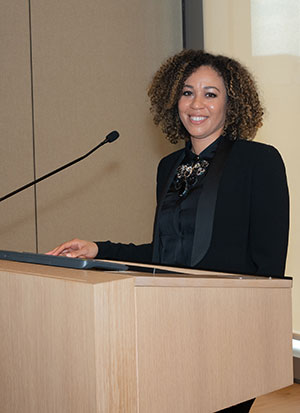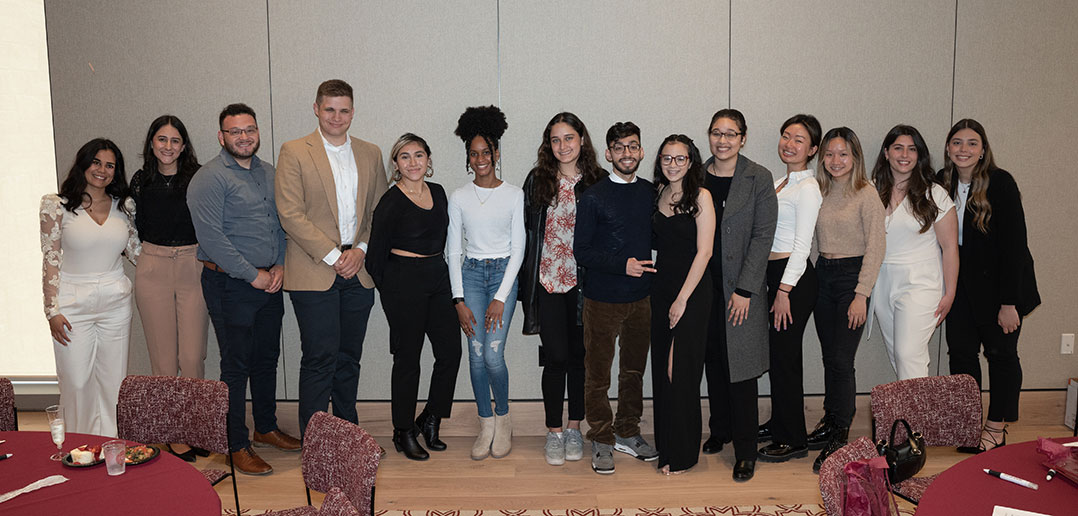Organized by Marisa Villani, senior assistant dean for undergraduate studies at the Gabelli School of Business; Tracyann F. Williams, Ph.D., assistant dean for student support and success at Fordham College at Lincoln Center; and Christie-Belle Garcia, Ph.D., assistant dean for student support and success at Fordham College at Rose Hill, the event included more than a dozen graduating seniors from Fordham’s new First Gen Network.
Seniors Leslie Ann Abreu and Qi Di Zhang kicked off the ceremony with a heartfelt thank-you to attendees—“the people who have formed networks of support for first-generation graduating students”—before introducing keynote speaker Adrienne Boykin, a 2009 Gabelli graduate and a member of Fordham’s Multicultural Organization Supporting Alumni Initiatives and Community (MOSAIC) affinity chapter.
“This is truly a moment to celebrate for both you and your families because we know, as first-generation college students, we are not only celebrating for ourselves, but we’re also celebrating on behalf of our families and our communities,” Boykin said.
Words of Wisdom from a Fordham Grad

After studying accounting at Fordham, Boykin earned an M.B.A. from Mount Saint Mary College. In 2014, she “came full circle” when she joined America Needs You, a nonprofit offering mentoring and career development support to first-generation college students. She’s currently the organization’s chief financial officer.
Boykin encouraged graduating seniors to celebrate their achievement and take a minute to reflect on their college journey, especially times when they may have felt impostor syndrome.
“With the support of your family, your friends, and the Fordham community, you remembered that you actually earned your spot at Fordham, that you belong, and that you are paving the way for not only yourself but for future generations to go to college and to graduate,” she said. “The perseverance and strength that you have [shown] all of these years led you to today.”
Boykin imparted three tidbits of wisdom: “Impostor syndrome will continue to present itself in your life; however, you can and will get through it. Mentorship matters. And keep an open mind during life’s journey.”
Following Boykin’s address, each student’s name was called, and they received a commemorative pin. The ceremony also included a champagne toast.
A Supportive Alumni Community
A handful of alumni were also in attendance. As first-generation grads themselves, they offered advice and shared tips they’ve picked up in the years since they graduated from Fordham.
Marcella T. Barry, FCRH ’92, GSE ’96, vice chair of the President’s Council— a group of successful professionals and philanthropists committed to mentoring Fordham’s future leaders—encouraged students to stay connected to Fordham after graduating, and to “wave their first-gen flag” whenever possible.
“You do belong here because you worked really hard,” said Barry, the chief people officer at Jitjatjo, a staffing marketplace and workforce management platform. “Embrace it, and don’t hide it. Talk about it. It defines who you are, and in life, it’s those stories that are really important to tell.”
Jason Caldwell, GABELLI ’10, ’17, GSAS ’11, a vice president at Goldman Sachs and another President’s Council member, had an informal chat with the soon-to-be graduates during the reception. He gave them his contact info—and urged them to use it.
“Because Fordham has been so generous to me, I feel like it’s my duty to do the same,” he said, sharing that every position he’s held since graduating has been due to his Fordham connections.
“If someone ever tells you that they’re willing to help you and to give them a call or reach out, take them up on it,” Caldwell said. “That’s the only way that you can get ahead and move forward more easily.”
A Family Role Model and Future Educator

Abreu, a psychology major whose family migrated to the Bronx from the Dominican Republic when she was 13, said she takes pride in being the first college graduate in her family, and in serving as a role model for her little sister and her whole family.
She’s enrolled in the Accelerated Master’s in Teaching Program at Fordham’s Graduate School of Education. After earning her bachelor’s degree this month, she’ll continue working toward a master’s degree specializing in bilingual childhood education.
More than providing her with an education, Fordham has helped Abreu come out of her shell. “When I first came over here, I thought I’d be able to manage without socializing,” she said. “I used to be very introverted, very closed off. It’s been a transitional four years. I was not expecting that I’d be able to really step out of my comfort zone and express all my ideas and perspectives.”
Keeping Your Options Open
Chantz Kouveras said that although his parents made clear their desire for him to attend college, he wasn’t always sold, instead contemplating some career paths that didn’t require a college degree. But ultimately, he was swayed.
“I wasn’t necessarily seeing the opportunities that college would open up,” said Kouveras, who will earn a bachelor’s degree in political science and classical civilization, and will serve in the National Guard after graduation. “Looking back, I’m grateful because when you’re 18, you have no clue how many doors you’re going to be closing to yourself if you don’t take certain opportunities.”
One of the most surprising things about college, Kouveras said, was how much he had to figure out for himself, such as housing registration; luckily his friends and the Fordham community helped him navigate it all.
“There’s a lot that’s just kind of left to you,” he said. “To me, that’s just the college experience: figuring what you have to figure out on your own and building a network to help you out with that stuff.”
Preparing for a Career, Not Just a Job
Qi Di Zhang, a Long Island native who studied business administration with concentrations in marketing and consulting and a minor in economics, credits Fordham with teaching her balance.
“Being first-gen, I had to figure out how to balance schoolwork, getting a job, socializing, and having time to take care of myself,” she said.
Growing up, Zhang said that attending college was considered “a no-brainer” in her home. Her parents “came to America with the notion that you’re here to have better opportunities, and the first step of that is to get a better education.”
“My mom didn’t finish middle school, and my dad didn’t finish high school. My parents have jobs,” she said, “but they want me to have a career.”
Founded by students last fall, the First Gen Network connects and supports students who are the first in their families to pursue college degrees. Allies of first-generation graduates are welcome.

